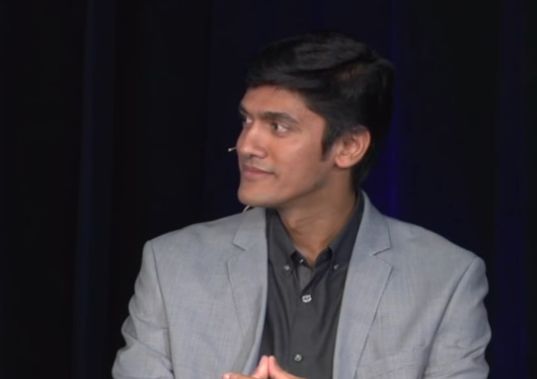 BIG DATA
BIG DATA
 BIG DATA
BIG DATA
 BIG DATA
BIG DATA
Collecting and storing commercial data is one thing, but who uses that data? Getting data to end users in a quick, efficient manner is one way to monetize information. New technologies are making it possible for companies to open up their data to their analysts, marketers and executives while retaining control and governance over the data.
“We call it data democratization. It’s not about having the data; we want the business users to actually use the data,” said Santhosh Mahendiran (pictured), global head of technology, information management, at Standard Chartered Bank.
Mahendiran spoke with John Furrier (@furrier), host of theCUBE, SiliconANGLE’s mobile live-streaming studio, during the recent BigData NYC event in New York to discuss data democratization and data lakes, highlighting industry use cases. (* Disclosure below.)
Data democratization is an outcome for many companies seeking efficiencies for their workers, but there is also a journey. Historical data warehouses are becoming redundant, as they cannot scale up to meet modern data needs. Data lakes, where data flows in and collects in one place, are stepping up to meet the demand, according to Mahendiran. Now, the real issue is finding the value hidden in those data lakes.
Typically, end users have found data to be delayed or denied to them. Often, this was due to the size of the data. With data lakes, companies have restructured how data is stored, allowing them to supply the data out in a more flexible way, Mahendiran explained. Now, end users can better access their data and draw on it in a more self-service manner. This is data democratization.
“Most importantly, from an [information technology] perspective, we’ll be able to govern it,” Mahendiran said. Data democratization isn’t about giving users a tool and telling them to go figure it out. Companies need to have control over their data. Even while users have access, rules and controls still determine who can see what and what they can do with it.
For Standard Chartered Bank, two notable use cases helped define data democratization. One was stress testing. The business was able to move its testing process from weeks to days, Mahendiran stated. The other case involved dealing with financial crimes. Again, new ways of using data brought those investigations down to days.
“The key part is making sure the end users can access the data much earlier in the lifecycle,” Mahendiran concluded.
Watch the complete video interview below, and be sure to check out more of SiliconANGLE’s and theCUBE’s coverage of BigData NYC 2017. (* Disclosure: Paxata Inc. sponsored this segment of theCUBE. Neither Paxata nor other sponsors have editorial control over content on theCUBE or SiliconANGLE.)
Support our mission to keep content open and free by engaging with theCUBE community. Join theCUBE’s Alumni Trust Network, where technology leaders connect, share intelligence and create opportunities.
Founded by tech visionaries John Furrier and Dave Vellante, SiliconANGLE Media has built a dynamic ecosystem of industry-leading digital media brands that reach 15+ million elite tech professionals. Our new proprietary theCUBE AI Video Cloud is breaking ground in audience interaction, leveraging theCUBEai.com neural network to help technology companies make data-driven decisions and stay at the forefront of industry conversations.